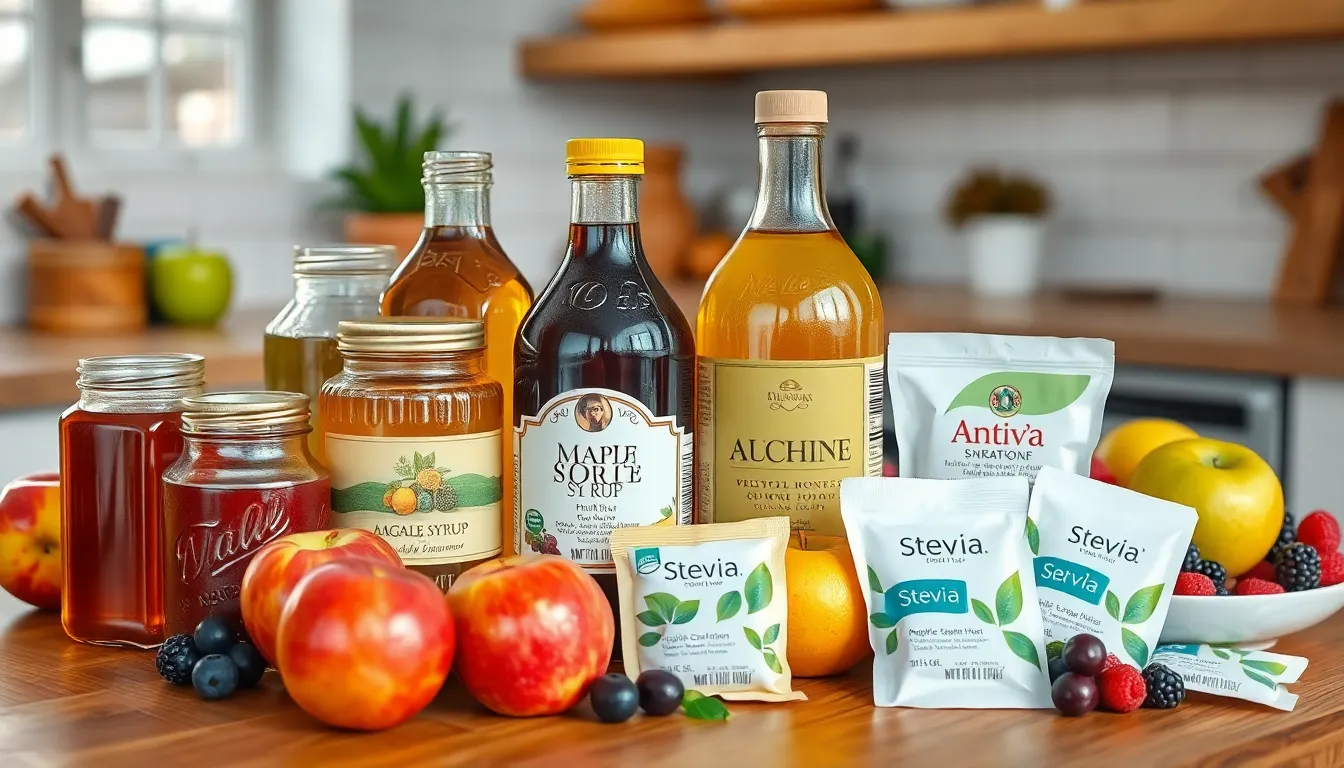In a world increasingly focused on health and wellness, natural sweeteners have gained popularity as a healthier alternative to refined sugars. These sweeteners not only satisfy a sweet tooth but also offer various health benefits, making them a go-to choice for many. From honey to maple syrup, these options provide unique flavors and nutritional advantages that processed sugars simply can’t match.
As consumers become more aware of the impact of sugar on their health, exploring natural sweeteners becomes essential. They can enhance recipes without the guilt associated with traditional sweeteners. Discovering the diverse range of natural sweeteners available can transform the way people approach their diets, making it easier to enjoy sweetness while prioritizing health.
Table of Contents
ToggleOverview Of Natural Sweeteners
Natural sweeteners serve as healthier alternatives to refined sugars, providing both flavor and nutrition. Various options exist, including honey, maple syrup, agave nectar, and stevia. Each sweetener offers distinct flavors, enhancing recipes while contributing health benefits.
- Honey: A versatile sweetener rich in antioxidants, honey supports digestive health. It has antimicrobial properties and may assist in soothing sore throats.
- Maple Syrup: Extracted from the sap of maple trees, maple syrup contains minerals like manganese and zinc. Its unique flavor complements breakfast dishes and baked goods.
- Agave Nectar: Derived from the agave plant, this sweetener has a lower glycemic index compared to sugar. It’s sweeter than cane sugar and often used in beverages.
- Stevia: Extracted from the leaves of the Stevia rebaudiana plant, stevia provides a zero-calorie sweetness. It’s suitable for those monitoring their caloric intake and doesn’t raise blood sugar levels.
- Coconut Sugar: Made from the sap of coconut palm trees, coconut sugar retains some nutrients present in the sap. It has a caramel-like flavor and a lower glycemic index.
Natural sweeteners can enhance recipes while promoting a healthier lifestyle. Awareness of the various types empowers consumers to make informed choices when substituting refined sugars in their diets.
Types Of Natural Sweeteners

Natural sweeteners provide flavorful and healthier alternatives to refined sugar. Below are some popular natural sweeteners, each with their unique characteristics and benefits.
Honey
Honey contains antioxidants, which support overall health. It aids in digestion, has antibacterial properties, and may soothe sore throats. Different types of honey, such as clover and manuka, offer varying flavor profiles and benefits. Honey is versatile, working well in teas, dressings, and baked goods.
Maple Syrup
Maple syrup is rich in essential minerals, such as manganese and zinc. This sweetener has a distinct, robust flavor and works excellently as a topping for pancakes, waffles, and oatmeal. The glycemic index of maple syrup is lower than that of refined sugar, making it a better option for blood sugar management.
Agave Nectar
Agave nectar consists of natural sugars, with a lower glycemic index than many alternatives. It is sweeter than sugar, requiring less quantity for the same level of sweetness. Agave nectar works well in beverages, desserts, and marinades, making it a favorite among health-conscious individuals.
Stevia
Stevia is a zero-calorie sweetener derived from the leaves of the Stevia rebaudiana plant. It offers a concentrated sweetness, meaning a small amount suffices for sweetening foods and beverages. Stevia does not raise blood sugar levels, making it suitable for diabetics. It can be found in both liquid and powdered forms, fitting various recipes and preferences.
Benefits Of Natural Sweeteners
Natural sweeteners offer a variety of advantages that extend beyond just taste. Their health benefits and positive environmental impact make them worthwhile alternatives to processed sugars.
Health Advantages
Natural sweeteners provide several health benefits that refined sugars lack.
- Nutrient Content: Honey contains vitamins, minerals, and antioxidants, supporting overall health and potentially boosting the immune system. Maple syrup offers essential minerals, such as zinc and manganese, which aid in various bodily functions.
- Lower Glycemic Index: Maple syrup and agave nectar have lower glycemic indices compared to refined sugar, which helps maintain stable blood sugar levels. This property makes them suitable for individuals managing diabetes or insulin sensitivity.
- No Empty Calories: Stevia provides sweetness without calories, making it ideal for weight management. Unlike refined sugars that contribute to weight gain, stevia can satisfy sweet cravings without added calories.
- Digestive Health: Honey acts as a prebiotic, promoting beneficial gut bacteria and aiding digestion. Regular consumption may contribute to improved gut health over time.
Environmental Impact
Natural sweeteners have a more sustainable environmental footprint compared to refined sugar production.
- Sustainable Sourcing: Many natural sweeteners, such as honey and maple syrup, come from renewable sources. Beekeeping practices can support biodiversity, while maple syrup production relies on tapping trees without damaging them.
- Lower Energy Consumption: The processing of natural sweeteners typically requires less energy and fewer resources than that of refined sugars. This reduction in energy usage contributes to lower carbon emissions.
- Supporting Local Economies: Sourcing natural sweeteners often supports local farmers and reduces transportation emissions, further benefitting the environment by minimizing the carbon footprint associated with food logistics.
How To Use Natural Sweeteners
Natural sweeteners enhance flavors and provide healthier alternatives to refined sugars in cooking and baking. Understanding their unique properties ensures effective use in various recipes.
Cooking With Natural Sweeteners
Honey serves as a versatile ingredient in marinades, dressings, and baked goods due to its moisture content and rich flavor. Maple syrup excels as a topping for pancakes, oatmeal, and as a sweetener in baked items. Agave nectar blends well in beverages, desserts, and salad dressings, offering a smoother flavor profile. Stevia provides concentrated sweetness, suitable for teas, smoothies, and low-calorie desserts. Coconut sugar, with its caramel-like flavor, complements baked goods and can replace brown sugar in recipes.
Tips For Substitution
- Start small: When substituting, use about 3/4 of the amount of sugar indicated in the recipe, as most natural sweeteners are sweeter than refined sugar.
- Adjust for moisture: For liquid sweeteners like honey or agave, reduce other liquids in the recipe to maintain consistency.
- Consider heat: Choose honey or maple syrup for recipes requiring heat, as they retain flavor and sweetness when cooked.
- Check compatibility: Ensure the flavor profile of the natural sweetener complements the dish, opting for stronger flavors in savory recipes and lighter ones in delicate desserts.
- Experiment gradually: Test different sweeteners in small batches to find the right balance of sweetness and taste in various recipes.
Natural sweeteners offer a flavorful and nutritious alternative to refined sugars. By choosing options like honey, maple syrup, agave nectar, stevia, and coconut sugar, individuals can enjoy their favorite treats while reaping health benefits. These sweeteners not only satisfy cravings but also contribute to a balanced diet and support sustainable practices.
Incorporating natural sweeteners into everyday cooking and baking can enhance meals without the guilt associated with traditional sugars. As more people become aware of their advantages, the shift towards these healthier options is likely to continue. Embracing natural sweeteners is a step toward a more mindful and health-conscious lifestyle.






